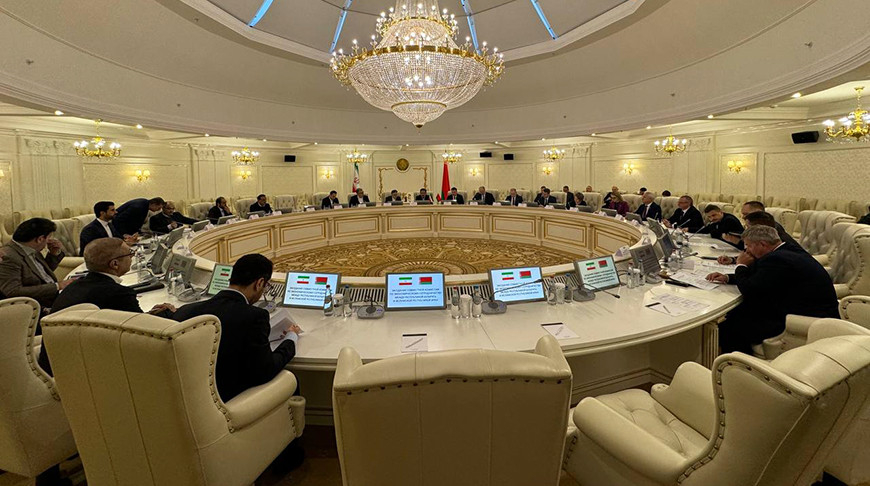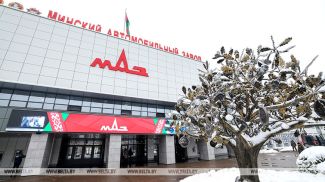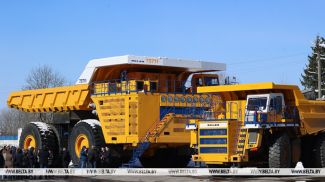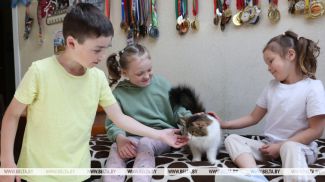
Photo courtesy of the Industry Ministry of Belarus
MINSK, 15 January (BelTA) – Belarusian Industry Minister Aleksandr Yefimov commented on cooperation prospects between Belarus and Iran prior to the 17th meeting of the joint intergovernmental commission on economic cooperation. Taking part in the meeting was Minister for Industry, Mining and Trade of the Islamic Republic of Iran Dr. Seyed Mohammad Atabak, BelTA has learned.
According to Aleksandr Yefimov, Belarus and Iran have something to work on when it comes to political contacts, trade and economic relations. “During today’s meeting we need to identify new points of growth that will drive the bilateral trade forward. Belarus and Iran face a number of foreign policy challenges. Both Iran and Belarus are subject to illegal pressure from a number of countries, which we strongly condemn. Yet, this is a global trend. Associations such as BRICS, SCO, and the Eurasian Economic Union show that the world’s most civilized countries are ready to cooperate. Belarus and Iran are a striking example of such cooperation, and these friendly relations benefit our states,” he said.
The industry minister added that bilateral cooperation has a lot of potential. “We are interested not only in supplying Belarusian goods, agricultural machinery (tractors, combines, trailers, mounted units), but also in creating and transferring competencies to manufacture high-tech products like agricultural machinery in Iran,” the minister said.
In addition, Belarus is also interested in expanding its presence on the Iranian market. “We are working hard to start supplying our goods for Iran’s mining industry. There are many avenues of cooperation that we can explore. We want balanced trade, therefore, we seek to use national currencies in our settlements as much as possible,” the minister noted.
Iran is a fairly high-tech country, Aleksandr Yefimov remarked. “It is a regional leader and it wants to maintain and heighten its leading role in the region. Iran produces a range of high-tech goods that are of interest to our country, including technological equipment, component parts, healthcare products, machinery, equipment, medicines and other pharmaceutical products, and so on,” he said.
A final protocol will be signed following the meeting that will thrash out cooperation plans. For example, the 16th protocol included about 40 activities, of which more than 30 have already been implemented or are in their final stage, and the work on the remaining projects is underway. “Such meetings are a fairly effective tool to further our cooperation agenda,” concluded Aleksandr Yefimov.
According to Aleksandr Yefimov, Belarus and Iran have something to work on when it comes to political contacts, trade and economic relations. “During today’s meeting we need to identify new points of growth that will drive the bilateral trade forward. Belarus and Iran face a number of foreign policy challenges. Both Iran and Belarus are subject to illegal pressure from a number of countries, which we strongly condemn. Yet, this is a global trend. Associations such as BRICS, SCO, and the Eurasian Economic Union show that the world’s most civilized countries are ready to cooperate. Belarus and Iran are a striking example of such cooperation, and these friendly relations benefit our states,” he said.
The industry minister added that bilateral cooperation has a lot of potential. “We are interested not only in supplying Belarusian goods, agricultural machinery (tractors, combines, trailers, mounted units), but also in creating and transferring competencies to manufacture high-tech products like agricultural machinery in Iran,” the minister said.
In addition, Belarus is also interested in expanding its presence on the Iranian market. “We are working hard to start supplying our goods for Iran’s mining industry. There are many avenues of cooperation that we can explore. We want balanced trade, therefore, we seek to use national currencies in our settlements as much as possible,” the minister noted.
Iran is a fairly high-tech country, Aleksandr Yefimov remarked. “It is a regional leader and it wants to maintain and heighten its leading role in the region. Iran produces a range of high-tech goods that are of interest to our country, including technological equipment, component parts, healthcare products, machinery, equipment, medicines and other pharmaceutical products, and so on,” he said.
A final protocol will be signed following the meeting that will thrash out cooperation plans. For example, the 16th protocol included about 40 activities, of which more than 30 have already been implemented or are in their final stage, and the work on the remaining projects is underway. “Such meetings are a fairly effective tool to further our cooperation agenda,” concluded Aleksandr Yefimov.













